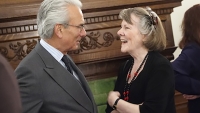Parent-Infant Psychotherapy

The Parent-Infant Program, under the direction of Talia Hatzor, PhD, provides an intensive, online, two-year training in the normal development and disorders of infancy and toddlerhood, with a focus on parent-child relationships and treatments. A foundational component of this program involves weekly one-hour in-home baby observation; this unique experience, wherein PIP participants follow a newborn through the first two years of life, is based on the internationally renowned Tavistock method. In addition, each student will be assigned an individual supervisor and will gain experience in intervening with a parent-child dyad. We facilitate matching PIP participants with both the infant observation settings and with their clinical placements.
Monday evening coursework comprises two sections. The first class, from 6:00-7:30PM, is a seminar devoted to the ongoing experience of infant observation. The second class, which is shared with CAPP participants for the first semester, meets from 8:00-9:30 and is organized around a series of scholarly and clinical topics. PIP classes will remain fully remote through June 2025.
In year 1, we read and discuss a range of psychoanalytic and attachment-based theories about early mental life and begin to examine dyadic and other interventions that enhance parent-infant relationships and support babies’ developmental progression. Our syllabus includes readings from and conversations about major theorists and researchers (e.g., Freud, Klein, Winnicott, Bion, Mahler, Bowlby, Stern, Fonagy, Maine, Salomonsson, Lebovici, and more).
In year 2, we look more closely at the potential challenges and psychopathologies of parenting and early childhood, including topics such as problems of pregnancy and the postpartum period, developmental issues, grief and mourning, the emergence of separation anxieties, intergenerational trauma, and disorders of eating and sleeping. Specific techniques in the clinical work with parents and infants will be taught.
The parent-infant program welcomes clinicians and scholars from several backgrounds who are interested in gaining in-depth knowledge of and experience with 0-3 populations and their parents; past participants have included psychologists, psychiatrists, social workers, occupational therapists, and pediatricians. We welcome clinicians who work with children and are interested in expanding their knowledge and skills to work with under three, and clinicians who work with adults and are interested in expanding their understanding of how to work with the infant-parent relationship.
Infant Observation
The Tavistock Model of Infant Observation is a distinctive method of learning through the naturalistic observation of an infant within its family setting. Its purpose is to deepen understanding of early development and to cultivate in students the capacities that form part of the psychoanalytic attitude. This experience provides a foundation for later clinical work in parent–infant psychotherapy, as well as in psychoanalytic practice with children or adults.
Each student visits a family with a baby for one hour each week, beginning shortly before the birth and continuing until the child is about eighteen months old. During these visits, the observer maintains a background stance of friendly attentiveness—quietly taking in the ordinary flow of family life without taking notes. The focus is on the observer’s learning experience rather than on intervention.
Through this sustained and intimate observation, students develop a capacity to witness how a mother and baby live through and resolve both ordinary and challenging situations in their own ways. In the accompanying seminar, observers are helped to understand babies and their unfolding experiences, and to reflect on the feelings and judgments that arise in themselves when anxieties are stirred. Often, the observer’s calm and containing presence proves beneficial to the parents, who may experience the visits as supportive and benign.
Alongside cultivating sensitivity and precision in observation, the course encourages students to think inductively from lived experience—to develop hypotheses grounded in what they have seen, and to begin to imagine how the developing infant is coming to make sense of the world.
In addition to the professional growth, collegiality, and intellectual enrichment our program provides, it offers participants many of the benefits afforded to Columbia University students, including online access to the university’s libraries and the ability to enroll in Columbia Student Health Insurance. Graduates earn a Certification of Professional Achievement from Columbia University and may claim a maximum of 30 continuing education credits (see below).
To Apply
Parent-Infant Psychotherapy Program Application
The Parent-Infant Psychotherapy Program will not be admitting new trainees for the 2026-27 academic year.
For further information regarding the Parent Infant Psychotherapy Training, contact the chair of the program Dr. Talia Hatzor at thatzor@gmail.com, or 917-439-8714.
Program Fees
Child Psychotherapy Training tuition for the 2025-26 academic year will be $4,870 per year for either program. Tuition is payable in two installments at the beginning of each term and increases at an incremental rate annually. Additionally, Columbia University charges a one-time document fee of $105 and a per-term technology fee of $232.
All students are eligible to enroll in Columbia Student Health Insurance for an additional fee. For details, please click here.
Tuition and fees listed here and elsewhere throughout this website are subject to change without prior notice.